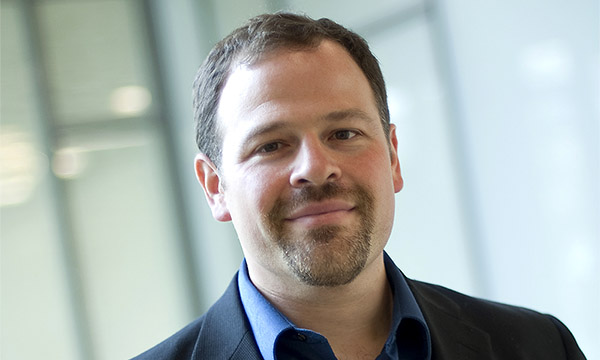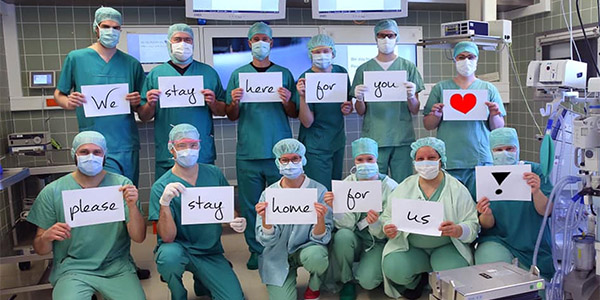3Q with MIT political scientist Adam Berinsky
On the impact of the pandemic on U.S. political life

Adam Berisnky, Mitsui Professor of Political Science; director, MIT Political Experiments Research Lab; photo by Stuart Darsch
"As they do in wartime "people are willing to give the government broader latitude, even to curtail civil liberties, to address this pandemic crisis. But this effect is also short-lived. People are willing to give up some civil liberties for months, but not years."
Adam Berinsky is the Mitsui Professor of Political Science and director of the MIT Political Experiments Research Lab. The author of two books: In Time of War: Understanding Public Opinion, From World War II to Iraq (University of Chicago Press, 2009) and Silent Voices: Opinion Polls and Political Participation in America (Princeton University Press 2004), Berinsky focuses his research on the political behavior of ordinary citizens.
SHASS Communications spoke with him recently about the impact of the pandemic on U.S. political life and the responses of the American people.
• • •
Q: In some ways, trying to subdue this pandemic is like conducting a war. As someone who has studied the relationship between war and U.S. domestic politics, what parallels do you see in current events, and what lessons from history do you believe might help American policymakers navigate the Covid-19 crisis?
Berinsky: In wartime, there tends to be a spike in support for the sitting president — a phenomenon political scientists call the "rally around the flag" effect. There's disagreement about why this happens, but one theory is that in times of crisis, even the most vocal, partisan opponents tend to tamp down their criticism of the president in a show of national unity.
This effect is echoed by public opinion. During the present crisis, we have seen a bump in support for President Trump, but what's interesting is how relatively small that boost has been. After the terrorist attacks of 9/11, President George W. Bush got a huge spike — more than 30 points. Trump's approval rating went up less than six points. Either way, though, such bumps are historically very short-lived.
What's likely to be much more important come November is the longer-term economic effects of the pandemic — things like the masses of people filing for unemployment. Those are things that will hurt a president. Another phenomenon common in wartime is that people are more willing than usual to cede power to the government. This happened after 9/11 and during World War II, and you can see it happening now; people are willing to give the government broader latitude, even to curtail civil liberties, to address the crisis.
But, as I observed in my book In Time of War: Understanding Public Opinion, From World War II to Iraq, this effect is also short-lived. People are willing to give up some civil liberties for months, but not years. After 9/11, Bush had a short window to push through the Patriot Act; within a year that political capital was gone. Similarly, after Pearl Harbor, there was initially a willingness to restrict free speech for communists and other marginal groups; by the middle of the war, the public's attitude had changed.
What does that mean for this moment? If the government decides to enact stricter measures for monitoring people during the pandemic, such as by tracking smartphones, will that be accepted? Perhaps. The crisis offers a short-term opportunity to push through policies that might not usually get support, and smart politicians will know that. For those opposed to such a policy, the thing to do is to wage a war of attrition — wait and delay until we get to more normal state. This is important because policy is sticky: Once a policy is in place, it's hard to change.

"Interestingly, while the reactions to the Covid-19 outbreak were politicized from the start, the gap between the parties was not as wide as it is on other issues. It looks as if the gap has gotten smaller, so it's possible that this lived experience might change some minds."
Related: Conducting a healthy and trustworthy 2020 election
Q: The pandemic is putting extraordinary stress on our political system, jeopardizing the election process and leading in some cases to an expansion of executive power. What developments concern you, and what can Americans do to safeguard our democracy — our democratic traditions, norms, institutions, and electoral infrastructure — in this time of crisis?
Berinsky: The thing that worries me most is election administration. If the world in November looks like it does today, how will we ensure that people are able to vote? We've already seen one battle play out in Wisconsin. The Democrats there wanted to extend the deadline for absentee ballots, but the Republicans opposed this. The election proceeded, but a shortage of poll workers meant significantly fewer polling places were open.
Did that affect the outcome? It's hard to know. But certainly, this example suggests that there will be big problems in November if we don't plan ahead. Unfortunately, voting is a partisan issue in the United States. Republicans assume that having more people vote will hurt their chances in the election. There's not a lot of evidence for this, but that's the belief. Democrats tend to believe that having more people vote will benefit them in elections.
So, there is a difference of opinion about whether it should be made easier or harder to vote. This makes it difficult for the two sides to work together to address the logistical challenges presented by the pandemic — which imperils the prospect of free and open elections for everyone. We need to start thinking about this now. My colleague Charles Stewart is an expert in this area, and he has been working with election administrators to suggest a series of best practices we as a nation can follow.
Q: Trust in science has declined over the past several decades. In what ways is this trend impacting the response to the pandemic? Do you expect the experience of the pandemic might affect public perceptions of science?
Berinsky: I've been studying political misinformation for the last 10 years, and I've thought a lot about this decline in belief in expertise. Since everything has become politicized, Republicans and Democrats don't agree about whom to trust. Republicans don't trust scientists; Democrats do. Interestingly, while the reactions to the Covid-19 outbreak were politicized from the start, the gap between the parties was not as wide as it is on other issues. It looks as if the gap has gotten smaller, so it's possible that this lived experience might change some minds.
Whether or not this will have long-term effects will depend a lot on how it all ends. Say we get a vaccine and it becomes clear that the vaccine ended the pandemic. Will that impact views on vaccination in general? I think that's a very interesting question. Down the line, I would love to do a research project on that.
The bigger question is: If science solves this problem, will it lead to an increased trust in science? I hope so. In other countries, science has not been nearly as politicized as it has been here; opinion about climate change, for example, is an area where we have seen much greater politicization in the United States.
In large part, I think that this is a result of marked differences in the way that U.S. politicians talk about science as compared to their counterparts in other countries. Perhaps this crisis will provide a window to tamp down that kind of rhetoric and move forward on the basis of expertise. The recent furor over when we should "reopen the economy" has given short shrift to health experts, so that doesn't make me particularly hopeful. But I could be wrong.
Suggested links
MIT Political Science
Adam Berinsky wins 2011 Levitan Award in the Humanities
Research + Perspectives for the Pandemic | Election 2020
Charles Stewart: Conducting a healthy and trustworthy 2020 election
Books
In Time of War, University of Chicago Press, 2009
Silent Voices, Princeton University Press 2004
Archive stories
Does cable news shape your views?
MIT study finds partisan news coverage has a bigger impact on viewers without strong media preferences.
Election Insights - Adam Berinsky on Electoral Polls
Mens et Manus America examines the politics of misinformation
Research on rumors and falsehoods in U.S. politics
The power of perceptions
Study shows how information sources affect voters.
Rumors have it
Study: Trying to correct political myths may only entrench them further.